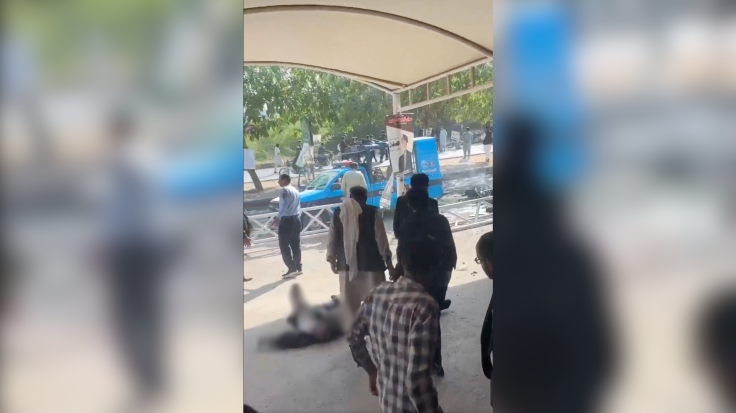Breakaway Taliban Faction Claims Responsibility for Islamabad Suicide Bombing That Killed 12
Splinter group Jamaat-ul-Ahrar claims Islamabad blast that killed 12 people

A breakaway faction of the Pakistani Taliban (TTP) has claimed responsibility for a deadly suicide bombing in Pakistan's capital on Tuesday that killed 12 people and wounded at least 27 others outside a crowded district court in Islamabad, marking one of the deadliest attacks in the city in recent years.
The bombing thrust Pakistan's internal security crisis back into the spotlight, even as immediate internal militant divisions surfaced regarding the claim.
Interior Minister Mohsin Naqvi confirmed the bomber failed to breach the court premises, instead triggering the explosives next to a police vehicle.
At least 12 people were martyred and 21 others injured in a suicide blast outside a kacheri court in the federal capital Islamabad. Police said that the explosion occurred in a car parked outside the facility. pic.twitter.com/0MFPmOBrbx
— Murtaza Ali Shah (@MurtazaViews) November 11, 2025
The blast, audible several miles away, tore through the busy district court area frequented by visitors and legal attendees, leaving behind scenes of chaos.
Emergency responders reported that most of the victims were passersby, describing the wounded crying for help amid burning debris.
According to media reports, a suicide car bombing occurred outside Islamabad District Courts, Sector G-11.
— TridentX ᴵⁿᵗᵉˡ (@TridentxIN) November 11, 2025
15 dead | 21 injured pic.twitter.com/5irAGEub4q
Naqvi confirmed that the bomber, whose severed head was recovered at the scene, was not included in the death toll, a detail crucial for investigators to verify the suicide nature of the attack, as first reported by The Associated Press based on analysis of CCTV footage.
Jamaat-ul-Ahrar Claims Responsibility Amid Taliban Infighting
Responsibility for the bombing was asserted by Jamaat-ul-Ahrar (JuA), a splinter faction of the TTP, via messages reportedly sent to journalists by its leader, Omar Mukkaram Khurasani.
Yet, senior JuA commander Sarbakaf Mohmand quickly denied any involvement, a crucial sign of the deep and ongoing operational and ideological rifts within Pakistan's fragmented militant networks.
The JuA broke away from the TTP in 2022 following its founder's death in Afghanistan. While some members have since rejoined the main Pakistani Taliban, this brazen strike in the heart of the capital suggests the lingering divisions remain active.
The attack underscores Pakistan's deepening security crisis, fueled by a militant resurgence along the border with Afghanistan.
Islamabad Blames 'Foreign-Backed Elements'
In the hours following the bombing, Interior Minister Naqvi alleged, without presenting evidence, that the assault was orchestrated by 'Indian-backed elements and Afghan Taliban proxies' linked to the TTP. India's foreign ministry swiftly rejected the claim, labeling it a 'desperate diversionary ploy'.
Interior Mohsin Naqvi says identity of the suicide bomber not known. At least 12 martyred, over two dozen injured in Islamabad suicide blast. pic.twitter.com/CY1uoxQObK
— Murtaza Ali Shah (@MurtazaViews) November 11, 2025
The bombing drew condemnation from a range of international partners, including the United States, China, Saudi Arabia, Qatar, and Türkiye.
The United Nations urged a full investigation, with Secretary-General António Guterres reiterating the call for 'all perpetrators of terrorism [to] be held accountable.'
Earlier Attack on Military College Preceded Capital Bombing
The Islamabad bombing was preceded by a coordinated attempted assault on Monday at an army-run college in Wana, Khyber Pakhtunkhwa province, where militants sought to take cadets hostage.
Security forces killed several attackers after a suicide car bomber detonated near the entrance gates.
Notably, the main TTP group denied involvement in both the college incident and the Islamabad bombing.
The proximity and coordinated nature of the two attacks have intensified concerns about a widening insurgent campaign targeting both security and civilian institutions across the country.
Sharif Vows Accountability as Tensions with Kabul Escalate
Prime Minister Shehbaz Sharif condemned the attacks as 'reprehensible,' pledging that those responsible would be swiftly brought to justice.
'We will not allow the blood of innocent Pakistanis to go to waste,' he stated.
The diplomatic fallout quickly spread, with Defence Minister Khawaja Asif accusing Afghanistan's Taliban-led government of actively harbouring the TTP and warning that Pakistan 'has the strength to respond fully.'
The remarks underscore the collapse of fragile peace efforts between Islamabad and Kabul, following border clashes and a failed ceasefire brokered by Qatar in October.
With peace talks stalling and militant violence rising, Islamabad now faces the grim prospect of renewed instability at home and worsening ties with its neighbor, who continues to refuse written assurances that militants will not use its territory to launch attacks in Pakistan.
© Copyright IBTimes 2025. All rights reserved.



















